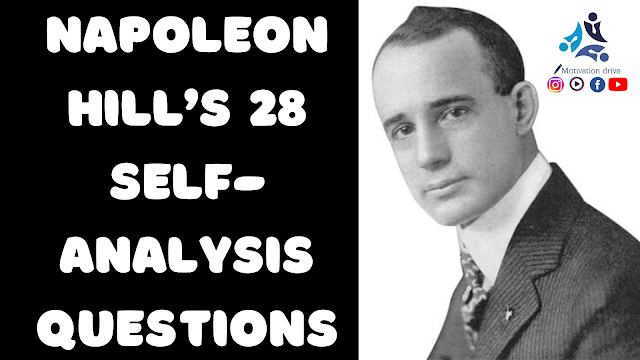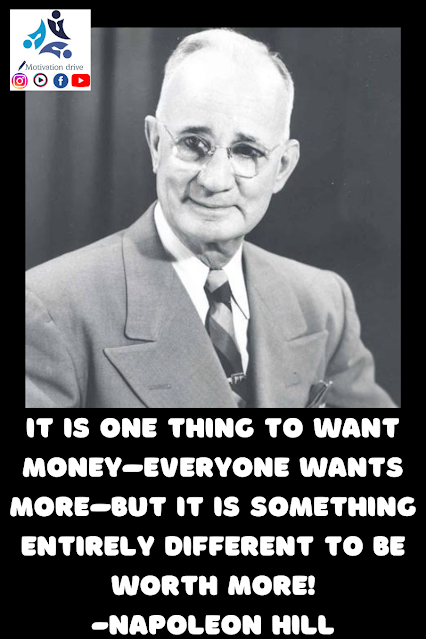Introduction Growth is rarely loud or obvious. Most people expect life upgrades to feel exciting, motivating, and energizing. They imagine clarity, confidence, and instant momentum. In reality, real growth often feels the opposite. It feels slow. It feels uncomfortable. Sometimes, it even feels lonely. If you’re in a phase where things feel slightly off—where your old life doesn’t fully fit, but the new one hasn’t arrived yet—you’re not broken. You’re not stuck. You’re evolving. Life upgrades don’t announce themselves. They arrive quietly, reshaping your inner world before your outer world catches up. The signs can be subtle, easy to misunderstand, and often mistaken for problems. Here are five powerful signs that suggest you’re not falling behind—you’re leveling up. 1. You Crave Solitude More Than Before One of the earliest signs of personal evolution is a growing desire for solitude. You may find yourself pu...
Introduction
Who doesn’t want to think and grow rich?Napoleon Hill’s Books are benchmarks of success and growth. Napoleon Hill’s 28 Self Analysis Questions are the most self-evaluative statements that one can ponder upon at length and get on with the mantras to the successful life. One must go through the most famous book of Napoleon Hill “Think and Grow Rich” for in-depth understanding of laws of success. Essentially, we are the magic and we have to tap into our own power of materialistic success. Most of the books of Napoleon Hill focus towards positivity, self-transformation and working towards human limitations. Napoleon Hill gave many examples in his book of the formula being used practically by many business men back in 18th and 19th century to this day.
Napoleon Hill’s 28 Self-Analysis Questions
1. The first question you need to ask yourself is that, have you attained the goal which you established as your objective for this year?Watch 3 Steps to Personal Development by Jim Rohn
2. The second self-analysis given by Napoleon Hill is to ask yourself that have you delivered service of the best possible quality of which you were capable, or could you have improved any part of this service?
3. Napoleon Hill suggests that you should analyze whether you have delivered service in the greatest possible quantity of which you were capable?
4. The fourth self-analysis question given in book ‘Think and Grow Rich’ is to ask yourself whether the spirit of your conduct has been harmonious and cooperative at all times.
5. The fifth question is that, have you permitted the habit of procrastination to decrease your efficiency and if so, to what extent?
6. The sixth self analysis question given by Napoleon Hill in his book ‘Think and Grow Rich’ is to analyze whether you have improved your personality, and if so, in what ways?
7. You need to self-introspect that whether you have been persistent in following your plans through to completion?
8. The eighth question given by Napoleon Hill is that, have you reached decisions promptly and definitely on all occasions?
9. The next question that you need to ask yourself is whether you have permitted any one or more of the six basic fears; poverty, criticism, ill health, loss of love of someone, old age, and death to decrease your efficiency?
10. Tenth question is whether you have been either “over-cautious,” or “under-cautious”?
11. Also find out that your relationship with your associates in work has been pleasant, or unpleasant?
12. Ask yourself if you have dissipated any of your energy through lack of concentration of effort?
13. The thirteenth question mentioned by Napoleon Hill is to see whether you have been open-minded and tolerant in connection with all subjects?
14. Ask yourself in what way have you improved your ability to render service?
15. Fifteenth question given in book ‘Think and Grow Rich’ is, have you been intemperate in any of your habits?
16. Next question is to analyze whether you have expressed, either openly or secretly, any form of egotism?
17. Find out whether your conduct toward your associates has been such that it has induced them to respect you?
18. Ask yourself if your opinions and decisions were based upon guesswork, or accuracy of analysis and thought?
19. Self-analyze whether you have followed the habit of budgeting your time, your expenses, and your income, and have you been conservative in these budgets?
20. The twentieth question given by Napoleon Hill is to ask yourself about how much time have you devoted to unprofitable effort which you might have used to better advantage.
21. Ask yourself about how you may re-budget your time, and change your habits so that you will be more efficient during the coming year?
22. Napoleon Hill suggest in his book ‘Think and Grow Rich’ to see if you have been guilty of any conduct which was not approved by your conscience?
23. Ask yourself, in what ways have you rendered more service and better service than you were paid to render?
3. Napoleon Hill suggests that you should analyze whether you have delivered service in the greatest possible quantity of which you were capable?
4. The fourth self-analysis question given in book ‘Think and Grow Rich’ is to ask yourself whether the spirit of your conduct has been harmonious and cooperative at all times.
5. The fifth question is that, have you permitted the habit of procrastination to decrease your efficiency and if so, to what extent?
6. The sixth self analysis question given by Napoleon Hill in his book ‘Think and Grow Rich’ is to analyze whether you have improved your personality, and if so, in what ways?
7. You need to self-introspect that whether you have been persistent in following your plans through to completion?
8. The eighth question given by Napoleon Hill is that, have you reached decisions promptly and definitely on all occasions?
9. The next question that you need to ask yourself is whether you have permitted any one or more of the six basic fears; poverty, criticism, ill health, loss of love of someone, old age, and death to decrease your efficiency?
10. Tenth question is whether you have been either “over-cautious,” or “under-cautious”?
11. Also find out that your relationship with your associates in work has been pleasant, or unpleasant?
12. Ask yourself if you have dissipated any of your energy through lack of concentration of effort?
13. The thirteenth question mentioned by Napoleon Hill is to see whether you have been open-minded and tolerant in connection with all subjects?
14. Ask yourself in what way have you improved your ability to render service?
15. Fifteenth question given in book ‘Think and Grow Rich’ is, have you been intemperate in any of your habits?
16. Next question is to analyze whether you have expressed, either openly or secretly, any form of egotism?
17. Find out whether your conduct toward your associates has been such that it has induced them to respect you?
18. Ask yourself if your opinions and decisions were based upon guesswork, or accuracy of analysis and thought?
19. Self-analyze whether you have followed the habit of budgeting your time, your expenses, and your income, and have you been conservative in these budgets?
20. The twentieth question given by Napoleon Hill is to ask yourself about how much time have you devoted to unprofitable effort which you might have used to better advantage.
21. Ask yourself about how you may re-budget your time, and change your habits so that you will be more efficient during the coming year?
22. Napoleon Hill suggest in his book ‘Think and Grow Rich’ to see if you have been guilty of any conduct which was not approved by your conscience?
23. Ask yourself, in what ways have you rendered more service and better service than you were paid to render?
24. You need to analyze whether you have been unfair to anyone, and if so, in what way?
25. Analyze that if you had been the purchaser of your own services for the year, would you be satisfied with your purchase?
26. The next question given in ‘Think and Grow Rich’ is to ask yourself if you are in the right vocation, and if not, why not?
27. Find out whether the purchaser of your services has been satisfied with the service you have rendered, and if not, why not?
28. The last question is to self-analyze that, what is your present rating on the fundamental principles of success?
25. Analyze that if you had been the purchaser of your own services for the year, would you be satisfied with your purchase?
26. The next question given in ‘Think and Grow Rich’ is to ask yourself if you are in the right vocation, and if not, why not?
27. Find out whether the purchaser of your services has been satisfied with the service you have rendered, and if not, why not?
28. The last question is to self-analyze that, what is your present rating on the fundamental principles of success?


Comments
Post a Comment
Please do not add any spam link in the comment box